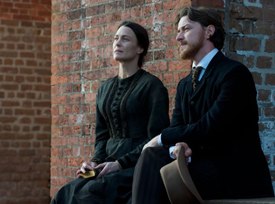It's hard to make a film where the female lead may or may not be a participant in one of the most heinous crimes in American history. Robert Redford's film attempts just that. What level of guilt she does have is not the point. This is a film about ideals and defending them in the most trying times. The story might be almost 150 years old, but it still resonates today.
Frederick Aiken (James McAvoy, X-MEN: FIRST CLASS) fought in the Civil War for the Union where he was wounded in battle. After the war, he returned to law. He like so many Americans was shook to his core when President Abraham Lincoln was murdered. Senator Reverdy Johnson (Tom Wilkinson, MICHAEL CLAYTON), who was key in keeping Maryland from seceding, took accused conspirator Mary Surratt (Robin Wright, THE PRINCESS BRIDE) on as a client out of principle. But he felt as a Southerner, he only hurt the woman's case, so he enlists the reluctant Aiken to take his place.
The accused plotters were not given civilian trials. A military jury made up of generals hand selected by War Secretary Edwin Stanton (Kevin Kline, A FISH CALLED WANDA) was set up. The accused were not allowed to see any of the evidence against them ahead of time and were not permitted to testify in their defense. Stanton, who was the de facto leader in Washington, was going to swiftly try these killers and let the country heal.
At first Aiken believes all the terrible things that have been printed in the newspapers about his client. Did you know she wears a necklace made of the bones of a Union soldier around her neck? Aiken's fiancee Sarah Weston (Alexis Bledel, SIN CITY) comes to the trial to try to figure out why he would defend such an evil person. But the more Aiken knows about Mary and the worse her treatment under a kangaroo court gets, the more determined he becomes in giving her the best defense he can give. There is a chance that Mary's worst crime is defending her son John (Johnny Simmons, JENNIFER'S BODY), who fell in with the wrong crowd.
McAvoy and Wright bring heart to their characters even though they are opposite in many ways. McCoy's Aiken is passionate and determined. He is a man of principle who will even go against his client's own wishes in order to try and save her life. Wright makes Mary introverted. She rarely shows any emotion, which makes it even harder to believe that she is innocent. But over time we do see where her passions lie. She asks Aiken if he has ever fought for something greater than himself and the lawyer says that is what he did in the war. She replies that is what she is doing now for her son.
Those attune to current politics will quickly draw connects to the stories of Jose Padilla, the American terrorist who was bounced around the court system until the government could find something to charge him with that would stick, and Troy Davis, a man executed whose guilt came into great question. While the film never overtly refers to these incidents, it shows us that in difficult times over the course of American history we have struggled with the same issues regarding the principles of justice.
The questions it brings up are numerous. If we bend the rules in trying times, how far will we bend? If the worst of the worst make us change our ideals, have they won? If we claim that the bending of the rules is only for the worst of the worst, who determines who is the worst of the worst? If the American judicial system is a beacon for the rest of the world, shouldn't it shine brightest in these cases? Where is the line between justice and revenge?
Redford made this film with The American Film Company, a new production house created to make historically accurate productions about important but little known historical events. James D. Solomon painstakingly researched the true events for the screenplay. Authenticity shines through in every aspect of the production. The dust and smoke from the gas lamps in the courtroom is a distinct touch, while adding a mysterious element to the proceedings as well. And some nice visual effects show off how wide open Washington D.C. was in those days.
In many ways, Aiken risks more in defending Surratt than he did in the war. In both fights, he risked his life, but the war made him an honorable hero, while fighting for the same rights in the court made him an outcast. Mary Surratt holds the distinction of being the first woman executed in American history. The fact that she was railroaded through a sham trial and denied so many of the basic rights all Americans should be afforded under law puts a greater pall over that distinction. Swift justice is no justice at all if it is wrong.








